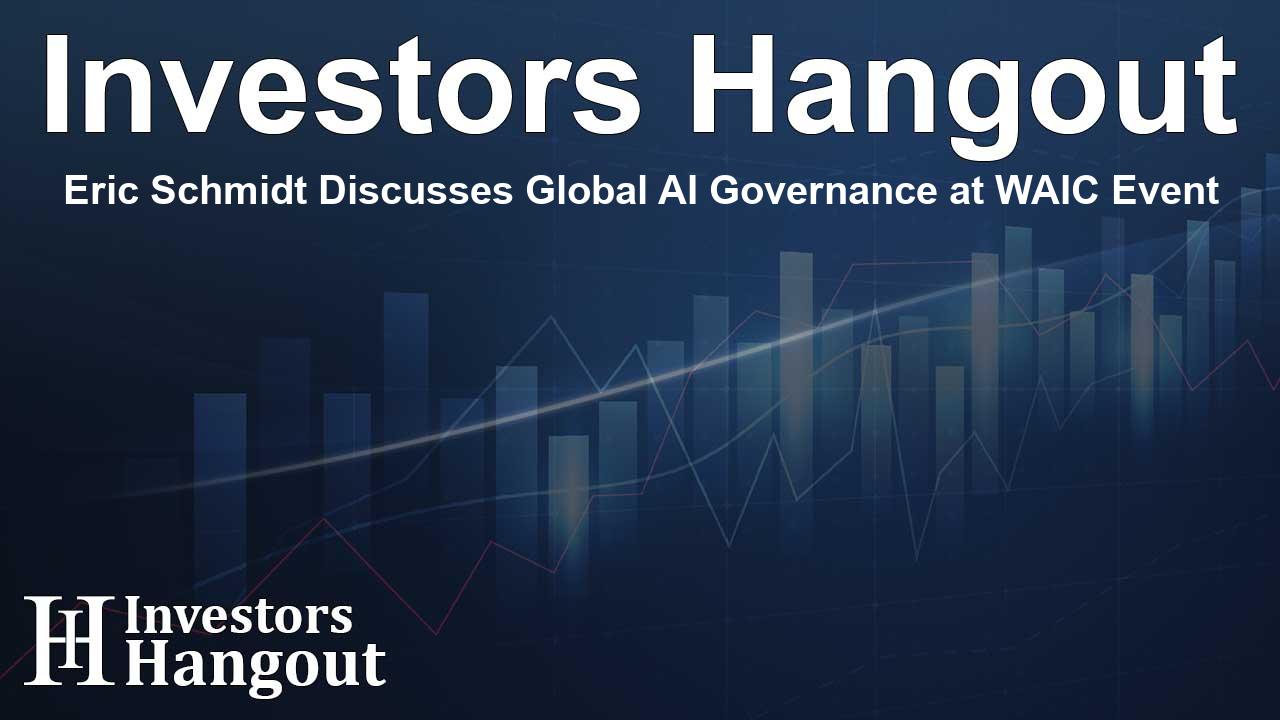Eric Schmidt Discusses Global AI Governance at WAIC Event

Eric Schmidt at the WAIC: Insights on AI Governance
During the 2025 World Artificial Intelligence Conference (WAIC), former Google CEO Eric Schmidt partook in a profound fireside chat focused on AI governance. Engaging in a dialogue with Harry Shum, a prominent figure from Microsoft, Schmidt explored the current challenges and future prospects facing artificial intelligence on a global scale.
The Core Challenges of AI Governance
One of the pivotal topics introduced by Schmidt was the pressing issue of global AI governance. He expressed that the greatest challenge is not merely access to AI models, but the lack of consensus on the parameters of their use. With advanced AI systems on the rise, whether they are open-source or proprietary, establishing enforceable safety standards requires collaborative international efforts.
The Need for International Cooperation
In discussing U.S.-China cooperation in AI, Schmidt affirmed that there should be a foundation of shared goals to ensure responsible technology deployment. He highlighted that addressing high-stakes issues, such as the development of AI for military purposes, should not be about halting advancements. Instead, it’s crucial to foster dialogue that ensures human oversight remains predominant over autonomous technologies.
Balancing Openness and Security in AI
As a proponent of open innovation, Schmidt tackled the delicate balance between promoting technological openness and safeguarding against potential misuse. He noted that many successful AI models emerging from China adopt open-source methodologies. However, the risk of misuse persists as the controls on these technologies can be circumvented. Schmidt advocated for global collaboration to enhance protective measures, asserting that a fundamental flaw in current AI practices is the lack of enforceable safeguards.
Advocating for Ethical AI Development
Schmidt's insights also reflected on creating a healthy ethical framework around AI development, reiterating key themes from his co-authored book, Genesis: Artificial Intelligence, Hope, and the Human Spirit. He underscored that without a shared moral framework, humanity risks losing control over technology's trajectory and its implications.
The Rivalry That Drives Progress
Reflecting on his experiences at Google, Schmidt illustrated how competition among tech giants like Google, Microsoft, and Apple fueled innovation. He argued that the same competitive spirit should apply internationally, particularly between the U.S. and China, in terms of AI governance. This cooperation is not just imperative for progress but also for maintaining global stability.
Looking Ahead: The Future of AI Governance
As the conversation wrapped up, Schmidt emphasized the importance of proactive engagement in establishing guidelines and norms for AI. He concluded that without structured governance, especially amidst rapid technological change, the potential for socio-economic ramifications is considerably heightened. His remarks resonated with the audience, leaving them to ponder the future responsibilities surrounding the fast-evolving landscape of artificial intelligence.
Frequently Asked Questions
What was the main focus of Eric Schmidt's talk at WAIC?
Eric Schmidt focused on the challenges of global AI governance and the need for international collaboration to effectively manage the technology.
How does Schmidt view the balance between openness and security in AI?
He believes in promoting openness in AI development while also recognizing the necessity for protective measures against misuse.
What historical context did Schmidt provide regarding competition in tech?
He discussed the intense rivalry among Google, Microsoft, and Apple, arguing that competition drives technological progress.
What are the implications of AI governance according to Schmidt?
He warned that without a shared ethical framework and international cooperation, humanity risks losing control of AI's future impact.
What future trends did Schmidt predict for AI development?
He emphasized the importance of establishing international norms and guidelines to mitigate the risks associated with rapid technological advancement.
About The Author
Contact Dylan Bailey privately here. Or send an email with ATTN: Dylan Bailey as the subject to contact@investorshangout.com.
About Investors Hangout
Investors Hangout is a leading online stock forum for financial discussion and learning, offering a wide range of free tools and resources. It draws in traders of all levels, who exchange market knowledge, investigate trading tactics, and keep an eye on industry developments in real time. Featuring financial articles, stock message boards, quotes, charts, company profiles, and live news updates. Through cooperative learning and a wealth of informational resources, it helps users from novices creating their first portfolios to experts honing their techniques. Join Investors Hangout today: https://investorshangout.com/
The content of this article is based on factual, publicly available information and does not represent legal, financial, or investment advice. Investors Hangout does not offer financial advice, and the author is not a licensed financial advisor. Consult a qualified advisor before making any financial or investment decisions based on this article. This article should not be considered advice to purchase, sell, or hold any securities or other investments. If any of the material provided here is inaccurate, please contact us for corrections.
